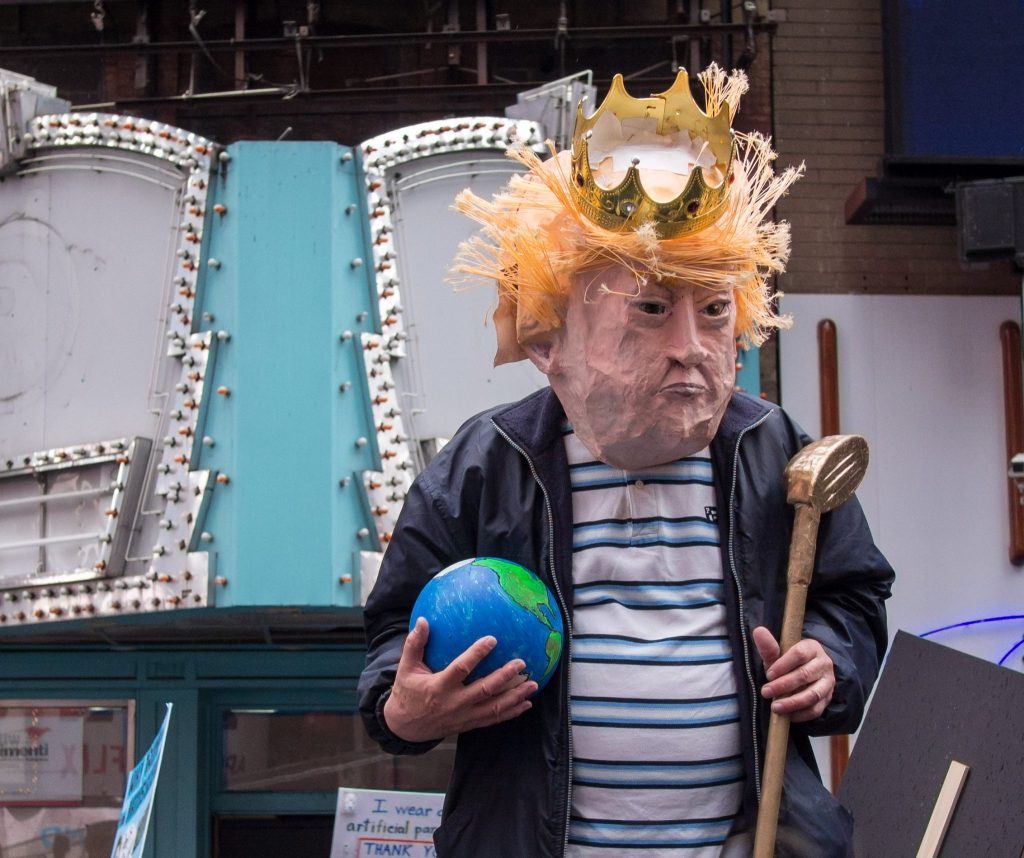The Trickster is a narrative character fighting powerlessly against the powerful. To understand Donald Trump and his voters a little better, a quick look at film, literature and mythology might help.
Trickster is the name of an archetype used in C.G. Jung’s analytical psychology, a repeating image that we experience in our lives and through stories by those who experienced them before.
The character of the Trickster is well known to us as part of the collective subconscious, as Jung describes it. But also as part of our consciousness: Jung has described the Trickster and many more archetypes, mythologist Joseph Campbell understood them as part of an arch-typical monomyth, and film development executive Christopher Vogler transformed it into the Hero’s Journey story model, which still is a vital part of narrative work in film and its outcomes (which again influence our experience).
Only his powerlessness justifies the actions of the Trickster
The Trickster is a narrative character fighting powerlessly against the powerful, initiating chaos to an order, that has been forced upon him; rising against suppression. He does that by cheating, deceiving, and conning. Tricks are the only tool the powerless have against the powerful.
And only this power divide justifies the trick. The declaration of our own impotence is a necessary argument in our justification of tricking. When we undermine the rules instead of trying to change them, when we evade taxes or hide marijuana, we like to reason that we wouldn‘t have any influence on those rules even if we wanted to.
This justification works much better in the gods-ruled mythologies of the antiquity or the feudalism of the middle ages (where for this reason it is much easier to think of a Trickster character you know) than in our democracies of today.
The fool mocks the powerful
But it does work today. And accordingly its reason is probably a regression in our possibilities of co-determination and self-determination. Here in Germany, even parliamentarians, whom people have mandated to make decisions, complain that all they can do is to vote on decisions of which the content has already been developed exclusively in the governmental departments.
Corporations that have significant influence in our lives don‘t have any democratic structure, not even on a surface level, and even understand it as their profit-lead duty to shield themselves from the influence of the customers. That people are anxious about handing some of the little power that remains to supranational institutions shouldn‘t surprise anyone.
There must be some kind of way out of here / Said the Joker to the Thief / There’s too much confusion, / I can’t get no relief. / Businessmen, they drink my wine, / Plowmen dig my earth. / None of them along the line / Know what any of it is worth.
Bob Dylan: All Along The Watchtower. (YouTube)
Speaking of the middle ages: regarding the Trickster, Jung also described the phenomenon ofboy bishops: children that got elected bishop for one day of the year. Anyway, back toTrump.
Trump is a fool (Wikipedia: “someone considered foolish, or someone displaying inappropriately vulgar, bumbling or ridiculous behavior that is a source of general amusement”) and we all know that. The problem with this statement: It can’t hurt him. It even helps him. Because the fool mocks the powerful.
The fool’s failure is evidence of the suppression by the powerful
The fool is the revenge of the “all-powerless” against the “all-powerful” and that is how we are supposed to understand Trump. And he‘s the revenge against the powerful in the Democratic and in the Republican party alike. There‘s probably a reason why the trump card Joker associated with the fool was created in the American civil war; winning against the powerful, against kings and queens, while not belonging to any color itself.
To remind us of one of the younger Tricksters in our history of narration, a quote:
Elizabeth: Whose side is Jack on?
Will: At the moment?
Ted Elliott, Terry Rossio, Stuart Beattie, Jay Wolpert: Pirates of the Caribbean: The Curse of the Black Pearl.
For Trump and his voters, Trump is a joker, a fool, a Trickster (from the french tricher = to cheat in a game): Resistance of the powerless against the suppression by the powerful. The simple existence of powerful people in a democracy is probably one of the problems; the other one is, that people feel powerless—not just less powerful, but without any power whatsoever.
The third problem: the fool can’t make a mistake. If he fails, it‘s the last evidence needed of the suspected suppression by the powerful. If he, the powerless, manages to succeed, it’s proof for the illegitimacy of power itself. (‘Powerless’ as in being president of the United States, well…)
An act of empowerment that contradicts the self-conception of being powerless
In point of fact ‘Trickster Trump’ (Jung: “an effigy of a consciousness undifferentiated in any sense, corresponding to a psyche that has not advanced from an animalistic level”) does not need to create anything at all with his new-found power, it suffices that he uses it to obstruct and destruct acts of creation done by others. That’s his revenge; that’s how he succeeds. That’s all he wants; that’s all his voters want.
Trump is not the Trickster Prometheus (least of all a ‘Prometheus’, fore-thinker, in the literal sense) who stole fire from the gods to give it to mankind—an act of empowerment and emancipation that would fully contradict Trump’s self-conception of being powerless. His job, as he understands it, would be nothing more than stealing—or probably extinguishing—it.
I am the Spirit that Denies! / And justly so: for all things, from the Void / Called forth, deserve to be destroyed.
Mephistopheles. Johann Wolfgang von Goethe: Faust. (Project Gutenberg)
I dare say that I predict that Trump at one point in his presidency is going to resign. He will do so to prevent an exercise of power against him—by the parliament about to impeach him or the people about to not reelect him; to obstruct an act of creation for the last time, again, a success to him and his voters.
The question of creation, which is an authoritarian act, leads us to the fourth problem:
Trump is not a Trickster
Trump is not a Trickster. He perceives himself as one, and his voters perceive him as one, too. But: neither Trump nor his voters are anti-authoritarian in any way. They have authoritarian personalities to the core. They don’t have a problem with power and its exercise, they have a problem with the powerful. Their problem: they are not the powerful. The motive here is jealousy.
Trump is like an anti-Einstein: “To punish me for my love of authority, fate made me everything but an authority myself.” Not being part of the elite, that he and his voters denounce, hurts. And the reaction they share is revenge.
Hermes, patron of the herdsman (herdsmen: leaders, Führers) is also patron of the thieves, and a god of oratory. His gifts to mankind—as revenge on Prometheus—are lies and sweet-talk—populism is what you would probably call it today. He is a Trickster himself who lied in front of the court and pledged a false vow on his innocence.
All storytelling doesn’t solve problems itself
This anti-morality is probably one approach to acting against Trump and similar phenomenons around the world in a narrative fashion: By unmasking the alleged Trickster as the jealous opportunist he is, and by questioning the perception of one’s own impotence that justifies tricking.
Plus, by showing who the powerful really are; by showing against whom destructive resistance might be reasonable, and which resistance in the long run targets other “powerless”, or even targets oneself. There surely will be very different answers to these questions, and they all need to be good—‘promethic’, well-thought-out,—answers.
At last: all storytelling only helps to shape perception, it doesn’t solve problems itself. You do. We as writers are powerless in this regard—but not as members of society, who are all-powerful to be authors of change.
Picture: Wikimedia, CC BY-SA 4.0.
Title track: Wolfmother – Joker & the Thief. (YouTube)
Further hearing: Mark Hamill, Luke Skywalker and voice of the Joker in Batman: The Animated Series reads some of Trump’s tweets: audioBoom.



We can cover that by a line of dialogue...